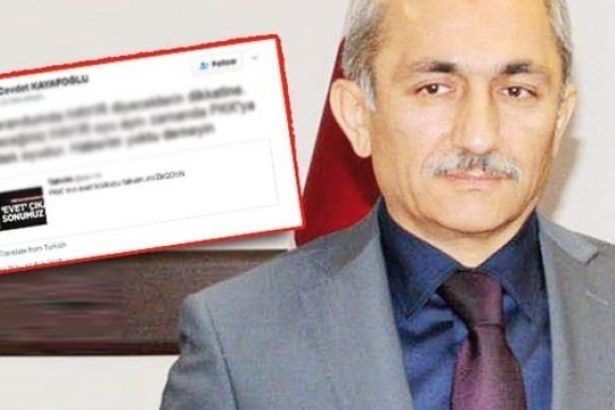Prosecutor intimidates citizens who will vote ‘no’ in referendum

"Those who will vote 'no' in the presidential referendum, are are seemingly venturing the same treatment with the outlawed Kurdistan Workers' Party (PKK)," a Turkish prosecutor said on Saturday, after the government and President Recep Tayyip Erdoğan labelling ‘no’-voters as terrorists.
Cevdet Kayafoğlu, Deputy Chief Public Prosecutor in the southern coastal city of Antalya, shared the message on his Twitter account. “The PKK [designated as a terrorist organisation by Turkey, EU and the US] has made a call to vote ‘no’ in the referendum. Those who will vote ‘no’ are seemingly venturing the same treatment with the PKK – take no offence,” Kayafoğlu wrote.
Kayafoğlu had tweeted an earlier post which as well targeted the 'no' voters. “To the attention of the ‘no’ voters in the referendum. The ‘no’ vote that you will give is also a support vote to the PKK" the prosecutor said.
In another tweet about the detention of the pro-Kurdish HDP MPs, Kayafoğlu commented: Considering the reactions from the USA and the EU for the detention of HDP members, Turkey is on the right track. It is not the time for laxity. This is the language they understand." It was also seen that there were pro-government posts on the account.
Mehmet Yılmaz, Deputy President of the High Council of Judges and Prosecutors (HCJP), who is a follower of Kayafoğlu’s Twitter account, saw the intimidation tweets. It has since become an issue of concern whether the HCJP will start an investigation about Kayafoğlu, who normally has to stand neutral.
As the reactions grow on the social media over the controversial tweets, Ramazan Solmaz, Chief Public Prosecutor of Antalya, declared that the case would be evaluated by the HCJP.
GOVERNMENT OPPRESSES VOTERS
One of the main elements of the ruling Justice and Development Party's (AKP) ‘yes’ campaign is labelling ‘no’-voters as terrorists.
"Why do we say ‘yes’? The PKK says ‘no,’ therefore we say ‘yes.’ The FETÖ [Fethullahist Terrorist Organisation, one of the masterminds of last July’s failed coup] says ‘no,’ therefore we say ‘yes.’ The HDP says ‘no,’ therefore we say ‘yes.’ Look at the ‘no’-voters and make your decision accordingly. This nation will chasten those who say ‘yes’ to separatism and the FETÖ in the referendum in April.” said the Prime Minister Binali Yıldırım two weeks ago.
Although the Minister of Justice Bekir Bozdağ has recently declared that the AKP was not picturing the ‘no’-voters as terrorists, President Erdoğan described the ‘no’-voters as “the continuation of 15th July,” referring to the failed coup in Turkey. “What does the separatist terrorist organisation say? It says ‘no.’ What do the followers of the ones in Qandil [PKK] and their extentions [HDP] say? They say ‘no’ altogether. Then, my people will not act in concert with those in Qandil, those killed my 248 martyrs and injured my 2,193 veterans, [...]. I believe that my people will give them the necessary response on 16th April [date of the referendum] by voting ‘yes.’ Because 16th April will also be a response to 15th July. It will be an important outburst to 15th July. The position of the ‘no’-voters is actually taking sides with 15th July at one point,” Erdoğan said.
BAR PRESIDENT: “UNACCEPTABLE”
Polat Balkan, President of the Antalya Bar Association, told that no lawyers could ever accept such a point of view and that someone at the office of the prosecutor should not behave in such a manner. “It is unacceptable especially for someone at the office of the prosecutor to convey his opinions in such a manner, threatening the society. This means scaring the society and by scaring, entering the service of a sub-government policy. It has no other meanings. There is a phrase by Hitler’s Minister of Public Enlightenment and Propaganda Goebbels that ‘jurisdiction shouldn’t be the master of the state, but a servant to its policies.’ If, as a result of this mentality, some members of jurisdiction are unfortunately able to express their thoughts in this way, I think, this manifestly is a post to threaten the society and to create a climate of fear,” said Balkan.
Balkan also noted that Kayafoğlu’s tweets constituted an explicit crime because of “abetting people to hatred and hostility."




